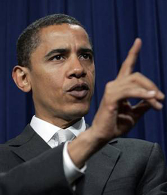
"If you are a business here, entirely located in the US, and investing in the US, and hiring workers in the US, you are paying a 35 per cent rate," Obama said in an interview to the business magazine Bloomberg Business Week.
"However, if you are a multinational and you are investing in India, and your workforce is in India, and your plants and equipment are in India, but your headquarters are here, you are taking deductions on all the expenses in India, but you are keeping your profits outside the US; and that just doesn't seem entirely fair," he argued.
"The same is true where you have companies that have 90 per cent of their sales in the US, but are posting 90 per cent of their profits overseas. You get a sense there that the accountants have been busy," Obama said.
Stating that he is all pro-business, the US president said, "our goal here is simply to make sure that there is an even playing field between businesses who are investing in the US, hiring American workers, selling to a lot of customers here as well as overseas. And that is an area where there can be some legitimate debate, but certainly shouldn't be portrayed, somehow, as being anti-business."
Responding to a question, Obama said the US can't be the consumer engine for the entire world while America is racking up more and more debts.
"The relationship between China and the US is obviously key to that. And I have said publicly, and I will repeat that China and its currency policies are impeding the rebalancing that's necessary."
"My goal over the course of the next year is for China to recognise that it is also in their interest to allow their currency to appreciate, because, they have got a potentially overheating economy," he said.
"There are a bunch of bubbles that are being created inside China. What you are also seeing is when China maintains a currency peg to the dollar, it is forcing other countries, particularly in Asia, to do the same," he said.
Admitting that currency devaluation goes beyond China, he said "China is the biggest player.
And we are going to have some very serious negotiations. And it's going to be bumpy, because China's entire growth model has been based on exports rather than internal consumer demand for a very long time. And they would be less vulnerable to the vicissitudes of trade."